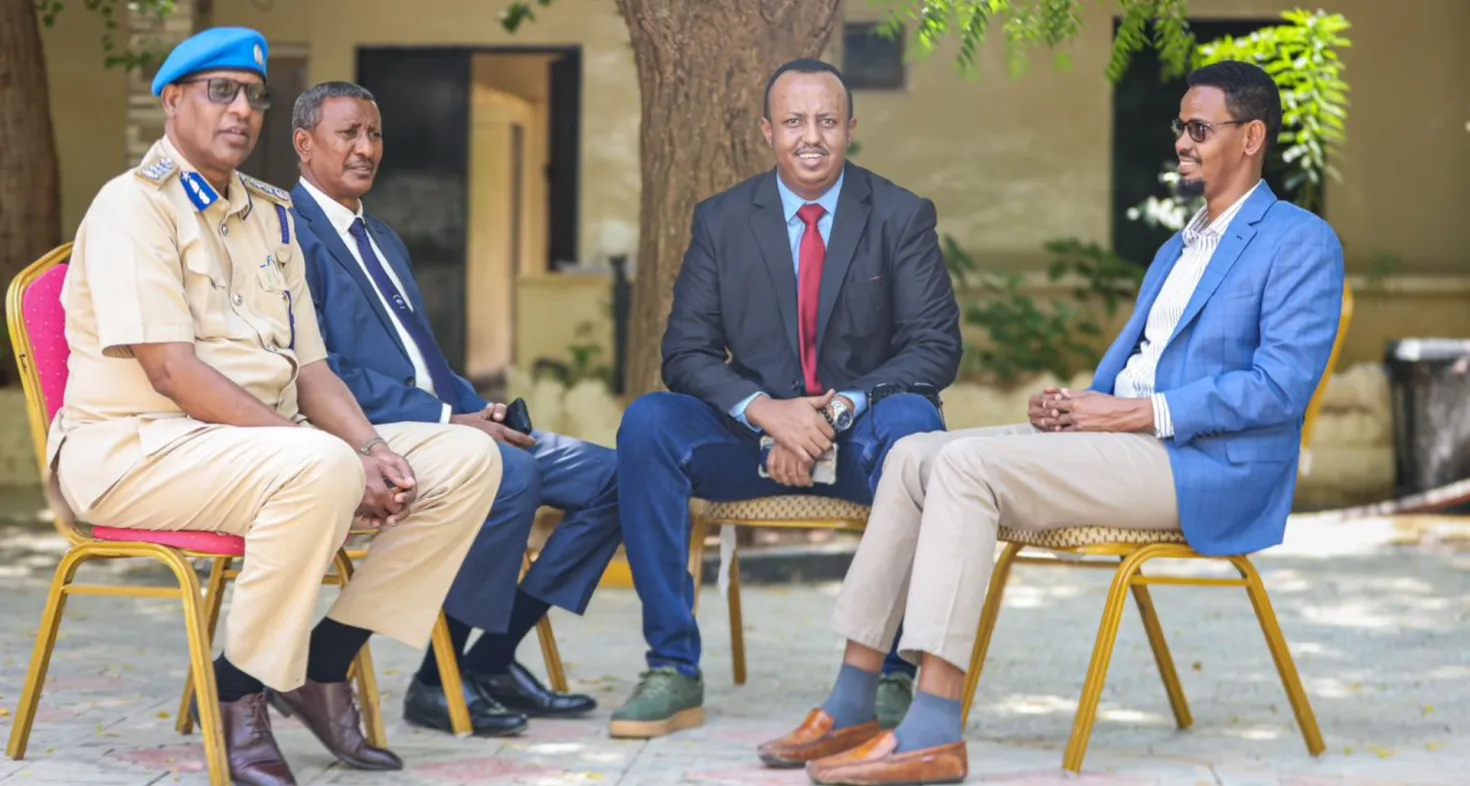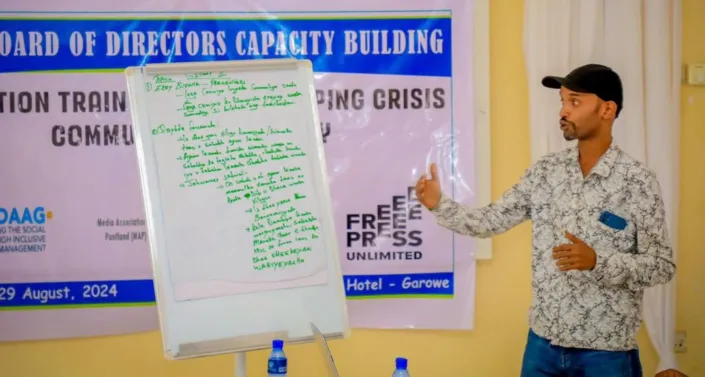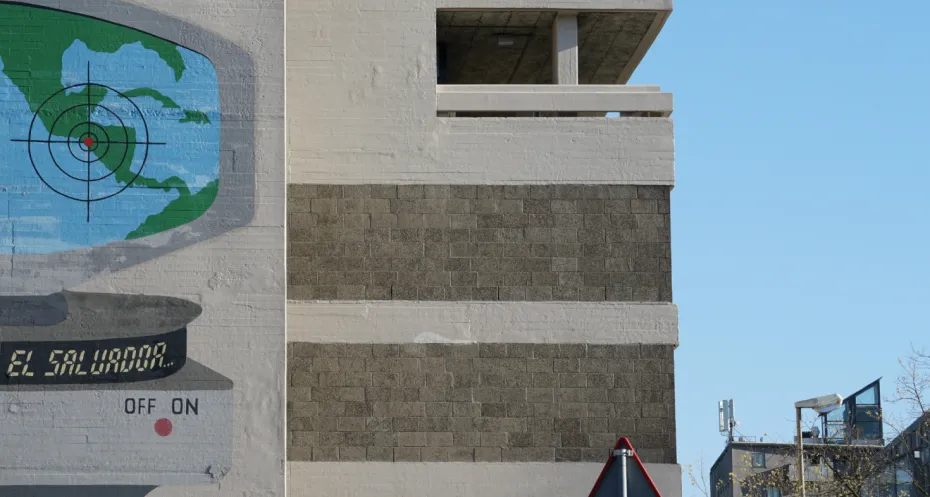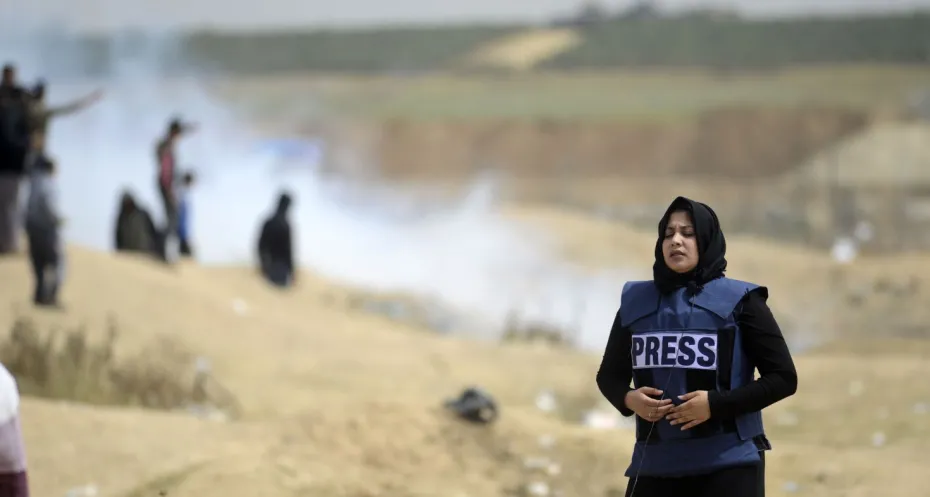
A milestone for press freedom in Somalia: the Access to Information Act
Since 2015, Ibrahim A. Mohamed has been working as a project manager at the Media Association of Puntland (MAP) in north-eastern Somalia. He passionately commits himself to the MAP mission: ensuring media freedom, improving media professionalism and settling media disputes. And not without results. Through the hard work of Ibrahim and his colleagues, the Access of Information Act was recently passed. A real milestone for press freedom in Somalia. Ibrahim tells us why and shares what the still existing risks are.
For more than seven years, Free Press Unlimited has supported the work of MAP which positions itself as the link between journalists and policymakers in Puntland. They promote press freedom and defend the right of journalists to report the news without fear. In 2022, MAP launched a significant advocacy project centered on the Puntland Access to Information Act, a key provision within the Puntland Media Law. This Act serves as a cornerstone for granting journalists access to government information, addressing a long-standing gap that had persisted since MAP's establishment in 2009. MAP’s Ibrahim Mohamed emphasises the transformative nature of this initiative: "The Access to Information Act is the main backbone for giving journalists access to government information, something that has not existed since MAP was established."
The need for access to information
Before the law was passed, the information landscape in Somalia was very different; there was no access to government data, meaning that journalists could not perform their watchdog function properly. Ibrahim explains that journalists could make an attempt to ask the government for information, but were always refused. “If it was a sensitive question regarding a crisis or corruption, the answer was no. They don't want journalists to have the opportunity to expose their wrongdoings.” He gives an example: “A journalist goes to a specific government official to ask for information about a budget that was misused, the ministry will tell the journalist that this information does not exist. They even tell you not to continue your research after your request, which forces you to quit your article.”

In Somalia, the relationship between government institutions and journalists has historically been strained. This tension often stems from a limited understanding of the crucial role the media plays in society. “Rather than recognising the media as a valuable tool for strengthening governance and promoting transparency, government institutions often perceive it as a threat. Journalists have the right to monitor the government and hold it accountable when necessary. This is essential for a democracy,” says Ibrahim.
Ongoing challenges
Given this situation, it is a historic landmark that the Access to Information Act has passed: it allows journalists to legally request information from the government. The question MAP is asking themselves is: what does this look like in terms of implementation?
“The job is not yet done,” Ibrahim explains. “We are trying to inform our journalistic community as well as possible. They need to fully understand the process of requesting information. On the other hand, the Minister of Information, who we are closely working with, has to inform the 21 ministries.”
Any mistake on our part can have long-lasting consequences and will be repeatedly used by both state and non-state actors to undermine the media, regardless of whether it directly relates to this law. That's why we are constantly raising awareness day and night.
What MAP tries to prevent is a journalist or media institution making a request for information but not following the correct process route. Ibrahim: "Any mistake on our part can have long-lasting consequences and will be repeatedly used by both state and non-state actors to undermine the media, regardless of whether it directly relates to this law. That's why we are constantly raising awareness day and night. We understand the serious impact of missteps, especially now that journalists will have access to sensitive information. As we reach this critical stage, we are determined to ensure that we fulfil our responsibilities so that we will not look back with regret.”
Continuous changes in crucial positions
Another challenge for MAP is the changing of key positions within the government, particularly roles such as the Police Commissioner, whom MAP relies on for the protection and safety of journalists. “Our advocacy efforts often lose momentum when there is a change in such crucial positions. For instance, if MAP and the police agree upon a roadmap or action plan for journalist safety, this plan becomes ineffective if the Police Commissioner is dismissed. We then need to engage with the new commissioner and frequently start from scratch. Consequently, agreements that are not legally binding often fall by the wayside during leadership transitions,” Ibrahim explains.
We have to keep the importance of access to reliable information on the agenda.
“As a result, we have to keep the importance of access to reliable information on the agenda”, he says. "Especially since the government does not keep archives. This reassures them of no evidence of corruption. It also means that the history and conversations about our work in advocating for better media laws and press freedom, always fall away when there is a change in positions. Because when there is no documentation you have to start again. That takes a lot of energy and remains an ongoing process that can take years,” says Ibrahim.
Resilience wins
He continues: “We know that the work we are doing is not easy. We are lucky that we already have experience in reforming the media law, which took three years. The government tries to dodge us, but once we get together, they know they cannot avoid us. We are trying to catch them and hold them accountable. The passing of this Access to Information Act is proof that it is possible after all."
Despite the challenges and continuous processes MAP has to go through, they are determined: they will continue to fight for press freedom in Somalia. “No angel will fall from the sky to get us out of this situation. So who will save Somalia if our own people are not willing to take the risk and courage?” Ibrahim tells us with a smile on his face.
Image credit: Mohamed Dahir, MAP Chair (second from the right), poses for a photo with the Puntland Deputy Police Commissioner (wearing a blue hat and police uniform), Puntland’s Minister of Information (second from the left), and the Director General of the Puntland Ministry of Information (first on the right, wearing a blue suit). The photo was taken outside the venue of MAP’s Annual 2024 Conference, held in November to promote the safety and protection of journalists, in collaboration with Free Press Unlimited.



